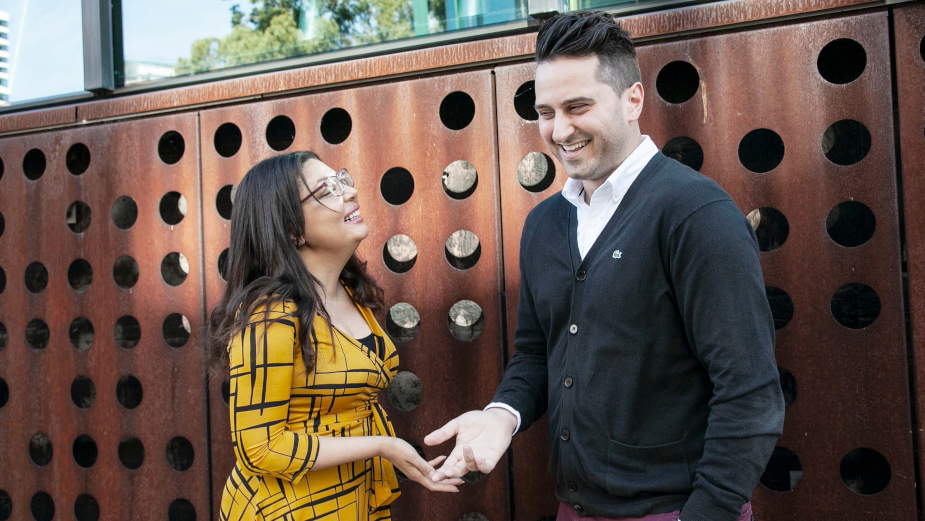
Magic Numbers: Inspired by Data with Ora Randle and Sonny Hovsepian

Inspired by Data is one of Cheil Australia’s taglines, as data is instrumental to the agency’s ongoing plan to enhance client performance in the world of digital, creative and retail. It was therefore appropriate that LBB featured Cheil’s strategy director Ora Randle and senior digital strategist Sonny Hovsepian to discuss the importance of data to enhance creativity.
Let’s start with an introduction to Ora and Sonny…
Ora Randle is passionate about strategy, data, and finding creative customer-focused solutions to business problems. As an experienced global professional with over 15 years of experience, Ora combines her engineering and business background to bring both creativity and progressive thinking to the heart of Cheil’s strategic and data insights.
Sonny Hovsepian entered Cheil with years of experience in e-commerce management, digital marketing, copywriting and design. Sonny was recently promoted to senior digital strategist, focusing on data strategy and planning to help maximise client results in the world of digital, creative and retail.
LBB> What’s the number one question that clients are coming to you with when it comes to how they can better use data to enhance the creativity of their content and experiences?
Ora> More and more clients are curious about how data can enhance creativity, their customer experience, assist with tracking ROI and finally improve their bottom line. We've had conversations about what the most important data sources are for their situation, with subtle reminders that it's always important to be flexible to meet the needs of the target audience, campaign goals and overall targets.
LBB> How can you make sure that data is elevating creative rather than forming a windtunnel effect and knocking all the interesting or unique edges off that make something distinctive?
Ora> One of the statements in our manifesto is ‘Inspired by Data’. Data is foundational in what we do, but we can let it lead the way and be used as the bedrock solution or lead to hints of inspiration to keep an open mind. Often something distinctive can come from the data insights, but it can also come from other sources, and we need to be flexible to work that into our creative outputs.
LBB> Can you share with us any examples of projects you’ve worked on where the data really helped boost the creative output in a really exciting way?
Sonny> A good example is The Serif TV campaign we did for Samsung Australia. We were able to drill down our data to target at a community level. We identified Chinese Australians as an audience subset that have the highest average cart values. This gave our creative team the confidence to push forward with creativity, which worked well with relevant media publications and social networks that specifically targeted Chinese Australians.
LBB> We talk about data driving creativity, but what are your thoughts about approaching the use of data in a creative way?
Ora> As a data and strategy team, we’re always striving to find rare and unique data sources. This not only keeps our work interesting, but also delivers fresh insights to the creative team so their outputs and ideas can be even more fascinating to our clients and their audiences.
LBB> "Lies, damned lies, and statistics" - how can brands and creative make sure that they’re really seeing what they think they’re seeing (or want to see) in the data, or that they’re not misusing data?
Sonny> Inconvenient truths can sometimes get in the way of a good and strategic story. But at the end of the day, our job as data analysts and strategists is to pursue the truth and the data behind that. We do this by trying to locate and confirm various data sources, so you get the entire story. Only then can we truly speak to our target audience, especially at an intimate level.
LBB> What are your thoughts about trust in data - to what extent is uncertainty and a lack of trust in data (or data sources) an issue and what are your thoughts on that?
Ora> We try to ensure that we as a team trust the data and data sources we are presenting to clients. In the information age we live in currently, one can always find a “source” to back up their approach or hypothesis. As practitioners, we need to feel confident and secure with what we’re presenting to clients and our data is sound.
LBB> With so many different regulatory systems in different markets regarding data and privacy around the world - as well as different cultural views about privacy - what’s the key to creating a joined up data strategy at a global level that’s also adaptable to local nuances?
Sonny> When speaking to data strategy at a global level, it is paramount that we address only overarching themes, giving local teams a chance to personalise to those local audiences they know so well. By staying in the macro view with our approach, we are doing our colleagues a great service and allow creativity to thrive locally.
LBB> In your view, what’s the biggest misconception people have around the use of data in marketing?
Ora> The biggest misconception right now regarding data in marketing is that people think they own their personal data while active on social networks. When customers use a social media network, they have essentially surrendered their personal details and demographics to advertisers, as outlined in the terms and conditions when they signed up for the account.
LBB> In terms of live issues in the field, what are the debates or developments that we should be paying attention to right now?
Sonny> I strongly believe we need to keep an eye on Web3 and how that is developing. People are becoming more conscientious with their data and are turning to Web3 for ultimate privacy regarding their identities, finances and communication. I believe token-based economics will rule society in the next decade with CBDC’s (Central Bank Digital Currency) and other digital assets/currencies. We as data analysts and strategists need to be able to intercept this trend in the future and plan accordingly.










